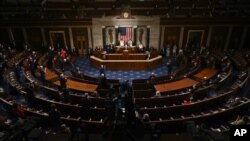ປະທານາທິບໍດີສະຫະລັດ ໂຈ ໄບເດັນ ໃນວັນພະຫັດມື້ນີ້ ຈະເປີດເຜີຍຂໍ້ສະເໜີງົບປະມານ ຢ່າງເປັນທາງການ ສຳລັບສົກປີຈະມາເຖິງນີ້ ໂດຍເປີດຕົວການສູ້ຊົນຢ່າງຕໍ່ເນື່ອງລະຫວ່າງທຳນຽບຂາວ ແລະລັດຖະສະພາ ກ່ຽວກັບວ່າ ລັດຖະບານກາງ ຄວນໃຊ້ຈ່າຍເງິນຫຼາຍປານໃດ ແລະບ່ອນໃດຄວນສຸມການໃຊ້ຈ່າຍໃສ່.
ຂັ້ນຕອນການຜ່ານງົບປະມານ ແມ່ນສະຫລັບຊັບຊ້ອນ ແລະເຕັມໄປດ້ວຍບັນຫາທາງດ້ານການເມືອງ ໂດຍບັງຄັບໃຫ້ບັນດາຜູ້ອອກນະໂຍບາຍ ຈະຕ້ອງທຳຄວາມເຂົ້າໃຈເຖິງຄຳຖາມທີ່ສຳຄັນໆ ກ່ຽວກັບວ່າ ຊາວອາເມຣິກັນຕ້ອງການໃຫ້ລັດຖະບານຂອງເຂົາເຈົ້າ ປະຕິບັດງານຫຼາຍປານໃດ ແລະພວກເຂົາເຕັມໃຈທີ່ຈະຈ່າຍຫຼາຍປານໃດ ສຳລັບວຽກງານນັ້ນ.
ໃນເງື່ອນໄຂຕ່າງໆທີ່ກວ້າງຂວາງ ການສູ້ຊົນດ້ານງົບປະມານໂດຍທົ່ວໄປແລ້ວ ຈະຖືກແບ່ງແຍກຕາມແນວທາງຂອງພັກແຕ່ລະຝ່າຍ ໂດຍພັກຣີພັບບລີກັນ ລົນນະລົງໃຫ້ມີລັດຖະບານຂ້ອນຂ້າງນ້ອຍກວ່າເກົ່າ ທີ່ໃຊ້ຈ່າຍເງິນໜ້ອຍລົງ ແລະດັ່ງນັ້ນ ຈຶ່ງເກັບພາສີລາຍໄດ້ຈາກພົນລະເມືອງຂອງຕົນ ໜ້ອຍລົງ. ສ່ວນພັກເດໂມແຄຣັດ ຂ້ອນຂ້າງຈະໄປໃນຟາກຂອງການຂະຫຍາຍລັດຖະບານກາງຫຼາຍຂຶ້ນ ໂດຍໃຊ້ທຶນໃນລະດັບທີ່ສູງຂຶ້ນຂອງການເກັບພາສີ ໂດຍສະເພາະຕໍ່ພວກທີ່ຮັ່ງມີ ແລະພວກບໍລິສັດທັງຫຼາຍ.
ມັນມີອົງປະກອບຂອງເລື້ອງລະຄອນ ໃນຂັ້ນຕອນດັ່ງກ່າວນຳດ້ວຍ. ເມື່ອຂໍ້ສະເໜີງົບປະມານຂອງປະທານາທິບໍດີ ໄດ້ຖືກເປີດເຜີຍ ຊຶ່ງບັນດາສະມາຊິກຂອງພັກຝ່າຍຄ້ານ ໂດຍສະເພາະແລ້ວ ເມື່ອພວກເຂົາຄວບຄຸມສະພານຶ່ງ ຫຼື ທັງສອງລັດຖະສະພາ ກໍຈະປະກາດໃນທັນທີວ່າ ມັນ “ຕາຍເມື່ອໃດມາເຖິງ” ແລະຈະອ້າງເຖິງອຳນາດຂອງລັດຖະສະພາ ເພື່ອຄວບຄຸມການໃຊ້ຈ່າຍ ຂອງລັດຖະບານ. ພັກຣີພັບບລີກັນໃນສະພາຕ່ຳ ຜູ້ທີ່ຄວບຄຸມສະພາດັ່ງກ່າວ ໃນປັດຈຸບັນນີ້ ຈະຫຼິ້ນບົດບາດນັ້ນ ໃນປີນີ້.
U.S. President Joe Biden on Thursday will release his formal budget request for the coming fiscal year, launching a perennial struggle between the White House and Congress over how much money the federal government should spend and where that spending should be focused.
The budget process is complex and politically fraught, forcing policymakers to come to grips with essential questions about how much Americans want their government to be doing, and how much they are willing to pay for it.
In broad terms, budget battles typically break down along partisan lines, with Republicans advocating for a comparatively smaller government that spends less money and therefore collects less tax revenue from its citizens. Democrats tend to line up on the side of a more expansive federal government funded by higher levels of taxes, particularly on the wealthy and corporations.
There is an element of theater to the process as well. When the president’s budget request is released, members of the opposite party — especially when they control one or both houses of Congress — will immediately declare it “dead on arrival” and assert congressional authority to control the government’s purse strings. House Republicans, who currently control that chamber, will play that role this year.




